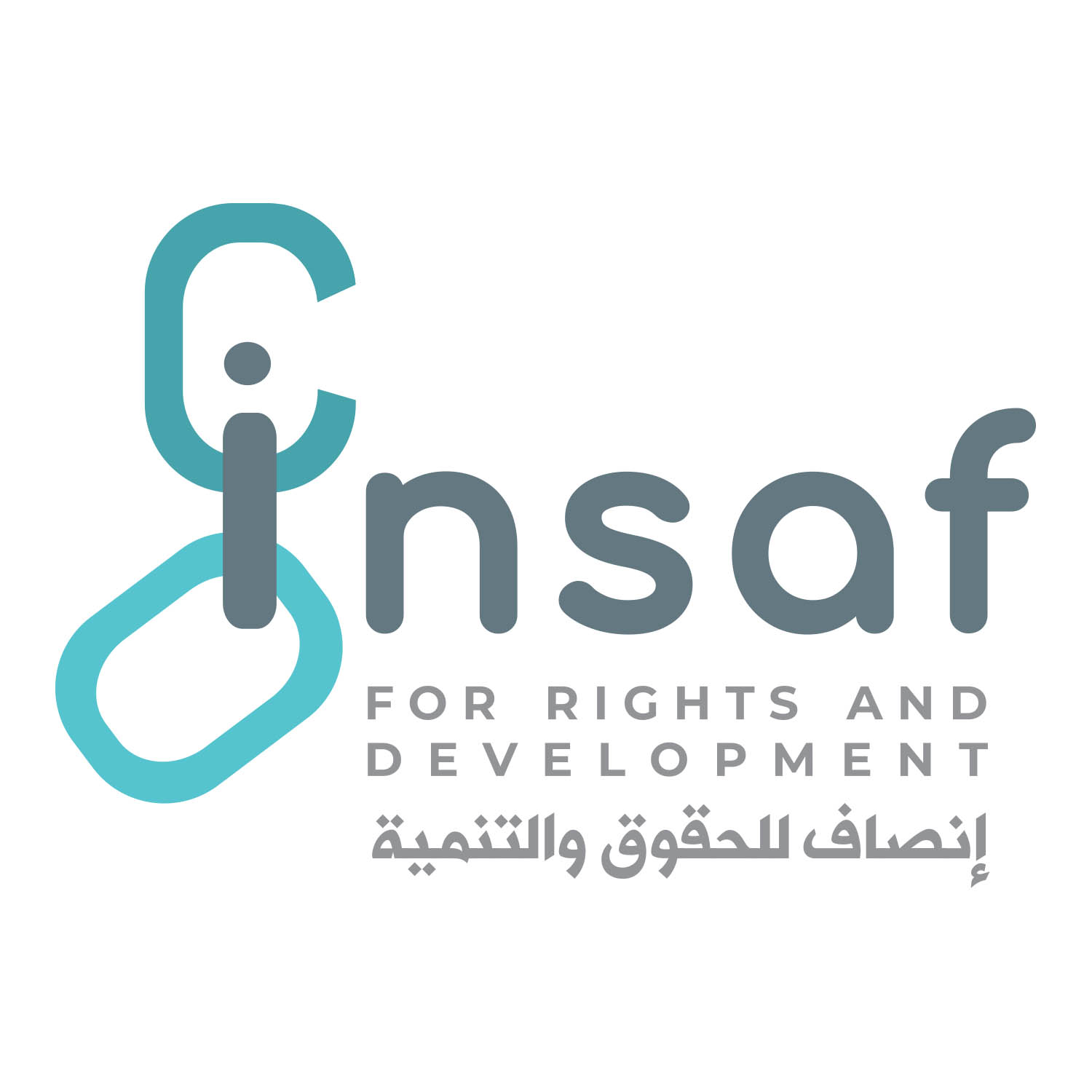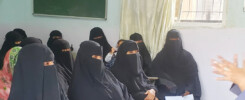He heard his mother’s voice asking her neighbor: “do you have some rice for my children, they are not able to walk and cry from hunger.” His mother’s words fell like bullets on his heart. Ahmed, “pseudonym”, says: “My feet became stagnant and I froze in place, and my hands was out of control such as a notebooks and books which were suddenly missed.” With these touching words, the young man Ahmed, 17 years old, began to tell his story with a full of pain and suffering.
In a modest neighborhood in the Sheikh Othman district in the temporary capital Aden, Ahmed dreamed of a bright future with full of hope and ambition, but that dream was shattered when his family’s that has poor circumstances forced him to leave school. Ahmed belongs to the marginalized minorities (Mohamshyn group) in Yemen, or as they are known in local community by the prevailing name (Al-Akhdam). These groups usually depend on daily wage whih is very difficult professions (such as porters), which is the profession that Abu Ahmed relies on to cover the daily of his family expenses, as these professions are considered low-income and very hard.
He says: “After hearing my mother asking for help, I vowed to myself that this situation would not happen again. My mother, the one with the precious soul, does not deserve this.” He added: “I left school and with her I left my dream and my colleagues, and I made a decision that I will pay the price for the rest of my life. However, I do not regret it.”
Ahmed’s journey from the market to the military camp
In order to provide a living for his family, Ahmed began his journey to look for work. He says: “I went early to the market in Sheikh Othman District, but I did not find any job opportunities. Then I decided to go in the afternoon to the central market in Mansoura District. There I collected some potatoes, tomatoes, onions and peppers that had been scattered from the stalls and returned home at night.”
Ahmed continued to work in the vegetable market for a month, where he carried heavy vegetable boxes. He recalls: “I worked with my neighbor, carrying baskets of potatoes, tomatoes and bags of onions. I carried anything he asked me to.”
One day, while working in the market, Ahmed heard a conversation between a business man and customer about registering his son in one of the military units that pay salaries in Saudi riyals. He says: “I took the advantage of this opportunity and loaded the business man’s belongings onto a trolley and delivered them to his luxury car. Then he told me that he would register me in any military unit after I explained my circumstances to him. He took pity on me, took my name and said to me: Inshallah, everything will be fine.” Less than a month later, Ahmed received a call and was sent to join one of the brigades on the West Coast. He says: “I was very happy, but my joy did not last long. My expectations were disappointed when I did not get a military number or a fixed salary. There were many who joined with me who got military numbers. Military numbers are considered an official fatwa for any new soldier, and this is exactly what Ahmed did not happen to. He says: I was only exploited to deliver food to the soldiers on the front lines, because I am marginalized.
The Great Tragedy:
One day, while Ahmed was transferring food to soldiers of the brigades that belong to the Joint Forces (this name is given to southern military formations, along with other forces formed by Tariq Saleh after he left Sana’a, in addition to local forces known as the Tihama Resistance, all of which operate on combat missions on the Yemeni west coast, and are stationed in the coastal city of Mokha), specifically the Al-Durayhimi front, the site was subjected to heavy shelling by the armed Houthi group. Ahmed recounts: “Suddenly, the sky turned into fire. I didn’t feel anything. When I woke up, I found myself in Saber Hospital in Aden. I opened my eyes, but I only saw half of the room. I felt a terrible pain in my head.”
The doctor told him that shrapnel from the shelling had penetrated his skull and taken his left eye, forcing doctors to install an iron plate to protect his head.
The suffering after the injury.
Ahmed backed to home with one eye and half a skull, to face a painful reality. He says: “I stayed at home for less than a month. The brigadier general I worked with did not provide me with any salary or financial assistant. The treatment at Saber Hospital was not enough. I suffer from chronic pain because of the iron plate that weighs down my head, and my sorrows for my health and future increase day by day.” Ahmed continues his speech with a voice filled with sadness: “The plate makes me unable to sleep or work. I have become a burden on my family and myself as well. I do not want to live like this!”
Today, Ahmed and his family live in very difficult circumstances, as they do not even have their daily expenses, while he dreams of traveling abroad to remove the plate and complete the treatment, but he knows that this dream is out of reach because of his current hard situation especially with the absence of government support and the downscale in international support for non-governmental organizations, which are usually limited to providing limited services to civilians. Since the outbreak of the war in Yemen in 2015, children have become direct victims of this devastating conflict. UNICEF reported in its 2022 report that 3,774 children were killed (2,742 boys, 983 girls, and 49 unknown), and 7,245 children were injured (5,299 boys and 1,946 as a result of shelling, airstrikes, and mines that tore their innocent bodies apart.
While the number of wounded until the same year exceeded 16,000 children, many of whom suffer from permanent disabilities that radically affected their future and were not limited to physical wounds, but left a deep impact on their souls, as they lost the ability to live as normal young people.
This suffering comes at a time when Yemeni law prohibits the recruitment and use of children in military operations, in line with international agreements ratified by Yemen. According to the Yemeni Child Rights Law, anyone under the age of 18 is considered a child, and therefore his recruitment or involvement in armed conflicts is a violation. To the law.
The marginalized in Yemen are considered one of the social groups that face many economic and social challenges, and suffer from discrimination in various aspects of life, whether in education, health or job opportunities. They are sometimes called “the marginalized” or “the servants” as we explained earlier, and they constitute part of the poorest groups in Yemeni society.
The poor economic reality in Yemen: Yemen is currently living in extremely difficult economic conditions as a result of the ongoing war since 2015, which has led to the destruction of infrastructure and the deterioration of the national economy. Reports indicate that more than 80% of the population is in need of humanitarian assistance, reflecting the extent of the economic crisis.
The marginalized groups suffer from this situation doubly, as it is difficult for them to access job opportunities or education, in addition to the lack of government support or social institutions concerned with helping them. In many cases, the marginalized rely on informal work such as collecting waste or working in simple handicrafts, and they live in poor and random areas.
These horrific numbers are stories of daily suffering for children who were supposed to live their lives in safety, but the war did not only take their lives, but also stole their dreams, their innocence, and their future, so that the tragedy remains a witness to the enormity of what wars can do to the lives of future generations.
But the field efforts made by agencies such United Nations and some international humanitarian actors are supporting and implementing projects that mitigate these violations and support ways of peace that guarantee them a decent life.
UNICEF Executive Director Catherine Russell said in a report after a field visit to Yemen in August 2022, “For children… life has become a struggle for survival; thousands have lost their lives, and hundreds of thousands more are still at risk of death.”
According to UNICEF statistics, more than 11,000 children have been killed and injured since the conflict escalated in March 2015 with the intervention of a Saudi-led military coalition to support the government to stop the advance of the Houthis – supported by Iran – that began in mid-2014.
UNICEF urgently needs $484.4 million to respond to the humanitarian crisis in 2023, according to the report. Russell said, “Ultimately, only sustainable peace will allow families to rebuild their shattered lives and begin planning for the future.”
Ahmed’s story is not just a tale of a young man who lost his eye and had his head weighed down with an iron plate, but rather a painful picture of the reality of thousands of children and young people who have become victims of armed conflicts. It is a call to the international community and humanitarian organizations to save Ahmed and others like him from this dark fate.




